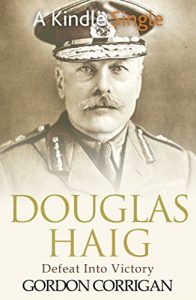Very few figures in British military history are the subject of such violently opposing views as Field Marshal Sir Douglas Haig.
Some see Haig as the man who won the war for the Allies, defeating the German Army through a war of attrition on the Western Front.
Others view him as an incompetent butcher, needlessly sacrificing the lives of thousands of young men for the price of a few metres of ground.
The popular view of Haig today falls into the latter category - that he was unfitted to command Britain’s armies on the Western Front, that he was out of touch with what was happening at the front, and that he was indifferent to the suffering of his men.
And yet a lot of this backlash against him started when it became apparent that the government could not produce a ‘land fit for heroes’ after the war, and people started looking for someone to blame.
Is there evidence to support the criticisms of Haig?
And if not, why do people believe them?
Now that most files relating to the Great War have been released it is now much easier to investigate the evidence relating to Haig than it once was, and Gordon Corrigan has separated the truth about Haig from the legend.
'Douglas Haig: Defeat Into Victory' tells the story of the most controversial commander in the history of the British Army.
Praise for Gordon Corrigan:
‘Political, fluent, well-researched and extremely argumentative’ – Andrew Roberts.
'Meticulously researched and well-written' Pennant
Major Gordon Corrigan is a retired Gurkha officer, a member of the British Commission for Military History and Fellow of the Royal Asiatic Society. Fluent in the Nepali language, he is now a freelance military historian and battlefield lecturer. He is a well known figure on the History channel. He is also the author of ‘Sepoys in the Trenches’, ‘Loos: 1915’ and ‘Wellington: A Military Life’.
Endeavour Press is the UK’s leading independent publisher of digital books.
Some see Haig as the man who won the war for the Allies, defeating the German Army through a war of attrition on the Western Front.
Others view him as an incompetent butcher, needlessly sacrificing the lives of thousands of young men for the price of a few metres of ground.
The popular view of Haig today falls into the latter category - that he was unfitted to command Britain’s armies on the Western Front, that he was out of touch with what was happening at the front, and that he was indifferent to the suffering of his men.
And yet a lot of this backlash against him started when it became apparent that the government could not produce a ‘land fit for heroes’ after the war, and people started looking for someone to blame.
Is there evidence to support the criticisms of Haig?
And if not, why do people believe them?
Now that most files relating to the Great War have been released it is now much easier to investigate the evidence relating to Haig than it once was, and Gordon Corrigan has separated the truth about Haig from the legend.
'Douglas Haig: Defeat Into Victory' tells the story of the most controversial commander in the history of the British Army.
Praise for Gordon Corrigan:
‘Political, fluent, well-researched and extremely argumentative’ – Andrew Roberts.
'Meticulously researched and well-written' Pennant
Major Gordon Corrigan is a retired Gurkha officer, a member of the British Commission for Military History and Fellow of the Royal Asiatic Society. Fluent in the Nepali language, he is now a freelance military historian and battlefield lecturer. He is a well known figure on the History channel. He is also the author of ‘Sepoys in the Trenches’, ‘Loos: 1915’ and ‘Wellington: A Military Life’.
Endeavour Press is the UK’s leading independent publisher of digital books.






